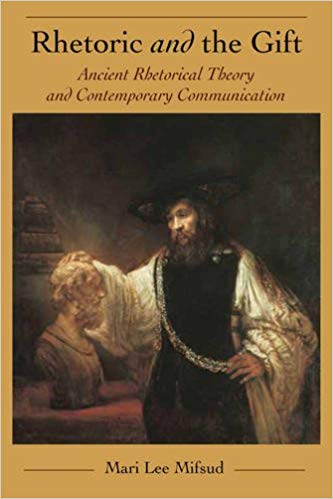Book Review: Mifsud’s Rhetoric and the Gift
Mifsud, Mari Lee. Rhetoric and the Gift: Ancient Rhetorical Theory and Contemporary Communication. Duquesne University Press, 2015.

Mifsud’s Rhetoric and the Gift does not offer a wide-ranging treatment of its subject, but instead aims through its brevity and intensity to achieve a resonance much greater than the scope of its 148 pages. Superficially, one could describe the book as a study of Homer’s influence upon Aristotle’s Rhetoric; however, such a narrow description would miss the wider implications of the work for topics like the relationship between poetry and rhetoric, the ethics of giving, the moral status of technē, and the role of exceptions and exceptionalism in politics and law. Mifsud accomplishes the rare feat of joining a skilled historical treatment with a rich set of theoretical resonances that are widely applicable to works on other periods and topics. Moreover, she accomplishes this historicized yet generative treatment in a playful, yet learned style. This makes the work invaluable for any rhetorical theory concerned with the ethics of exchange, poetry and rhetoric, technē, or exceptionalism, whether or not it has a direct relationship with the ancient works Mifsud examines.
Mifsud’s analysis hinges upon a construction of Homer as the figure of the poet in general. Following a discussion by Giambattista Vico in The New Science, Mifsud considers Homer “as an idea” (31), as “the original giver (the OG)” who “gives the sublime to the civic” (32, 33), and as a figure that “embodies multiplicity” in excess of technē (33). Poetry, then, is “the gift” of Mifsud’s title, offering itself as a sublime source of tropes for deployment in the civic realm by rhetoric. Aristotle then stands as the figure of rhetoric in Mifsud’s analysis, his deployment of Homeric examplars in the Rhetoric as the model of how rhetoric uses poetry in general. With poetry informing rhetoric, “something other already resides within techē,” which Mifsud terms “the archaic rhetorical gift” (12). Before becoming civic and instrumentalized, on this understanding, rhetoric is always already characterized by an act of gracious creativity, what Mifsud terms the rhetoric of gift/giving.
The archaic rhetorical gift has important implications, first of all, for rhetorical-historical method. Mifsud’s first chapter, titled “From Technical to Creative Historiography,” argues for the method of the book on the basis of its conceptualization of rhetoric as a gift. Mifsud defines technical historiography as operating with “an exacting efficiency to achieve the end of reason” (19). According to the strict logic of technē, Homer would not appear as rhetoric at all due to a lack of precise and logical argumentation as well as the absence of a polis to which he could speak. Homeric characters are thus conceived as lacking interiority, mirroring a common post-Enlightenment story about early societies. Rather than directly refuting this position and feeding “the negation machine,” Mifsud asks what “an affirmative attitude toward Homer” would offer (22). Through enacting “the preoriginary rhetorical gift,” the rhetorician can uncover a creative history and theory of rhetoric, characterized by reflexivity and self-referentiality, examining and critiquing its own premises even as it advances them. Such a rhetorical method would mirror the reflexivity of gifts, all of which both give and take. A creative historiography cannot avoid this dual movement, but it can call attention to it, and thus it can exceed the bounds of the technical, much as Homeric rhetoric goes beyond where traditional rhetorical structures can follow.
On the basis of such a creative history of rhetoric, Mifsud expands her understanding of Homer as a gift to rhetoric, drawing on rhetorical thought by Giambattista Vico and Henry W. Johnstone Jr. Homeric rhetoric advances a poiēsis, a figural, sensual, and holistic ethos that “is prior to and in excess of technē,” with its formal and analytic qualities (35). Mifsud illustrates this by examining scenes from Homer where characters deliberate over their course of action. Homer’s characteristic reticence about his characters’ motivations (though we see characters deliberate, seldom are we given reasons for why characters took the path they did) can make it seem as if Homeric narratives lack notions of reflection and interiority. However, Mifsud points out that Homeric deliberative speeches often begin with a reflexive statement, most commonly “Oh popoi,” an onomatopoeic expression of surprise that is often left untranslated and overlooked as merely expressive speech (36). However, Mifsud argues that even an expressive exclamation indicates a recognition of the self, an indication that the speaker had expectations that have now gone unfulfilled. Accordingly, such speech indicates the presence of what Johnstone terms a reflexive rhetoric, “the rhetoric of the self, directed to the self” (38). Such a rhetoric, for Johnstone, operates as a wedge, calling attention to a separation between the speaker and the situation (40). Mifsud finds evidence of this poetic, generative rhetoric everywhere in Homer. Particularly compelling is her reading of Penelope’s silence, which she finds to indicate both the oppression experienced by a woman in a patriarchal culture and a strategy for achieving “indirect power” (49). Ultimately, because “Homer is a poet of action, not of thought,” the rhetorical self-understanding of his characters remains a creative rather than a technical rhetoric, an invitation to the reader to identify with the character and participate in composing the preoriginary rhetorical gift.
To further illustrate how Homeric rhetoric “can be witnessed prior to and in excess of technē,” Mifsud then moves to catalog and examine the relations between Homer and Aristotle (54). She begins, in her third chapter, with an act of creative historiography in the form of a catalog of Aristotle’s references to Homer in the Rhetoric: a list with minimal elaboration, “working hard not to be an art of persuasion but just a simple display of items” (55). By adopting this catalog form, Mifsud herself invites the reader into a creative relation with her rhetorical work, an open call for potential responses. Mifsud’s minimal comments on the entries (including 36 direct quotes and 11 additional references) aim not so much to link them to her analysis as simply to explain their place in Aristotle’s text. Though she concludes the chapter by indicating that she “see[s] the figure of the gift” in the catalog, it nonetheless remains radically open to new and divergent uses by the reader, a reference guide and resource for further understandings of Homer’s place in Aristotle (66). For any reader hoping to do further work on Aristotle’s use of Homer, this chapter alone will prove invaluable.
In three subsequent chapters, however, Mifsud does offer her own interpretation of the catalog, highlighting what Aristotle takes from Homer and how his own technical rhetoric transforms his poetic source. First, “Aristotle takes from Homer what we can call ‘givens,’” a set of cultural commonplaces or topics which are deployed by the rhetor to do persuasive work (69). Homer’s work supplies the cultural knowledge that Aristotle’s rhetor draws upon to craft arguments, as well as illustrating the continuity between the gift-giving culture of Homeric Greece and the Aristotelian polis. Homeric gift culture thus “underwrites Aristotle’s rhetorical theory” both by offering it a set of resources and by supplying an understanding of a culture already characterized by the given (75). Second, “Aristotle circulates Homeric gift culture” materially through explicitly considering the rhetorical dynamics of gift culture (77). Mifsud examines how gift-giving practices inform Aristotle’s topoi of the good, pleasure, and anger, showing Aristotle to theorize all these rhetorical resources through Homeric gift culture. Finally, Mifsud examines Aristotle’s relationship to Homer in light of sacrifice, which “informs the gift and is an effect of the gift. To give requires sacrifice fo some sort, for to give is to give away, to let go” (95). Ultimately, Mifsud finds that Aristotle’s technical rhetoric sacrifices the more hospitable and creative ethic of Homer. Whereas Mifsud argues that Homer manifests an openness to solidarity through hospitality and displays an ambivalence about violence, Aristotle’s more restrictive circulation of the Homeric givens tends to return them to “distant, abstract mechanisms of power rather than personal relations” (103). By operating through technē rather than poiēsis and in the abstract realm of the polis rather than the familiar sphere of the household, Aristotle creates “a fundamental distance between self and other,” breaking with the reflexive rhetoric of the gift (103). He thus “transfigures communication into commodifiction,” making use of his audience rather than making friends with them (103). Aristotle thus sacrifices the more creative possibilites of Homeric rhetoric for political power, much as (Mifsud would argue) he sacrificed learning to power in serving as the teacher of Alexander the Great. Though Mifsud insists that she does “not wish to negate judgment,” her criticism of Aristotle’s rhetoric and sympathy with Homer as the sacrificial poet is clear.
Having traced how a rhetoric of gift/giving appears in the relationship between Homer and Aristotle, Mifsud then turns to consider the contemporary resonance of her analysis by examining the role of “the state of exception” in civic deliberations (107). For instance, she looks at the rhetorical role played by exceptions declared by President George W. Bush to the U.S. Patriot Act, which permitted exception detention practices aimed at those suspected of terrorist activities. Drawing on the work of Giorgio Agamben, Mifsud shows how the the state’s appeal to exceptional circumstances comes to dominate political and legal conduct, expanding to provide the key rhetorical resource for those seeking to reify imperial power. Because exception literally means “to take outside,” a state of exception can be seen to operate within the giving and taking of a rhetoric of the gift (112). Accordingly, “exception in its full rhetoricality is itself a gift, both as a poison and as a remedy for civic life” (111). Appeals to exception draw on unwritten law, that which exceeds the stated code, and thus circulate excess in a rhetoric of gift/giving. Though the state uses exception to oppress and to distance the other from the polis, exception as a gift “can always be otherwise” (113). Mifsud thus aims not just to expose the pernicious uses of the rhetoric of exception, but to reclaim its positive uses as a rhetoric that gives as well as takes.
I began this review by terming Mifsud’s work one possessed of great resonance, but perhaps a better metaphor would be that this is a generous book: abundant, even excessive, in the concepts and connections it offers to its readers. Some readers may not wish to receive every gift it offers: one might legitimately suspect, for instance, the stark contrast Mifsud draws between Homer and Aristotle to be somewhat overdrawn (could Homer really be that woke?). Mifsud wants to use the two classical figures as exempla, figures of the Poet and the Philosopher, and in that regard the contrast can be sustained, but scholars of a more tightly historicist bent may wish for a more detailed defense of this line of argument. Mifsud’s handling of technē also seems likely to court controversy in rhetorical studies. By opposing technē to her own category of creative communication, Mifsud defines technical communications as reductive, insufficient, and even oppressive. This is an undeniably strong stance toward an important subfield in rhetorical studies and a term that for many scholars lies near the heart of rhetoric’s purpose as rhetoric. Engagement with rhetorical defenses of technē, such as Kelly Pender’s Techne, from Neoclassicism to Postmodernism (Parlor Press, 2011), might not have changed Mifsud’s criticisms of technical communication, but would at least have provided helpful context for what amounts to a rejection of a whole branch of rhetorical work. These concerns, however, should not be taken as marking Mifsud’s work as insufficient, problematic, or any of the host of scholarly descriptions used to dismiss work within a critical paradigm. They are merely meant to mark the bounds of the book’s argument, places it went where one reader was not fully able to follow. Nonetheless, Mifsud’s rhetoric of gift/giving is itself a gift to rhetorical studies, an offering that expands possibilities for thinking about excess and creativity in communication. I’m grateful for it.
KEYWORDS: Aristotle’s Rhetoric, critical thinking, gift-exchange theory, Homeric rhetoric, rhetoric and poetry




 Matt Miller serves as Assistant Professor of English at College of the Ozarks in Point Lookout, Missouri. Previous work on rhetorical history and theory has appeared in Present Tense and the Journal of Communication and Religion. He also writes about place, ecology, religion, and ideas for a variety of literary and public journals. Contact him online through his website, matt-miller.org.
Matt Miller serves as Assistant Professor of English at College of the Ozarks in Point Lookout, Missouri. Previous work on rhetorical history and theory has appeared in Present Tense and the Journal of Communication and Religion. He also writes about place, ecology, religion, and ideas for a variety of literary and public journals. Contact him online through his website, matt-miller.org.